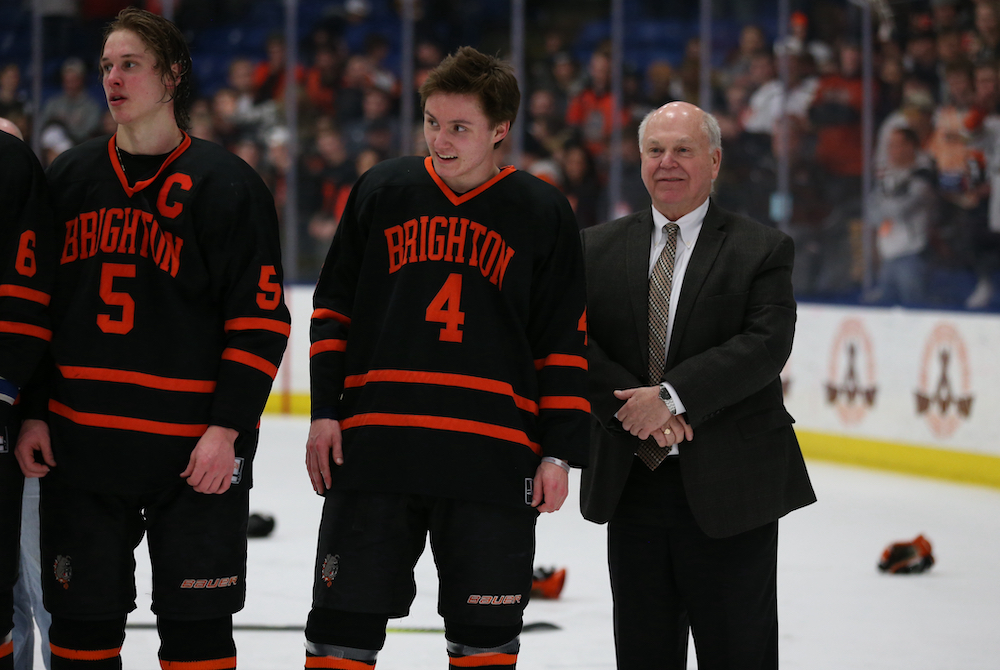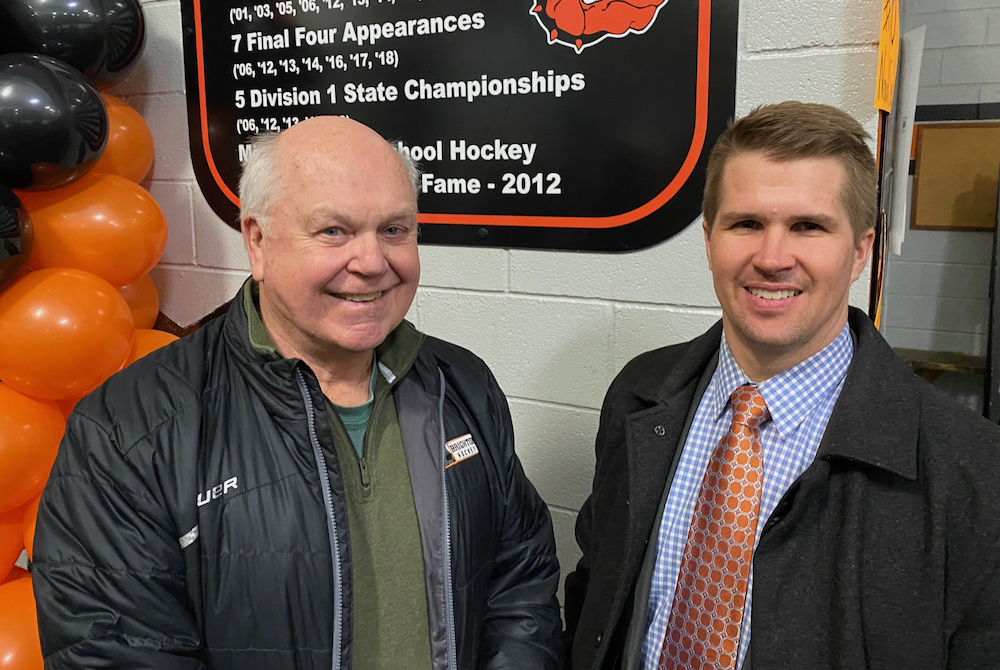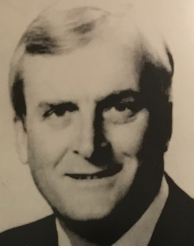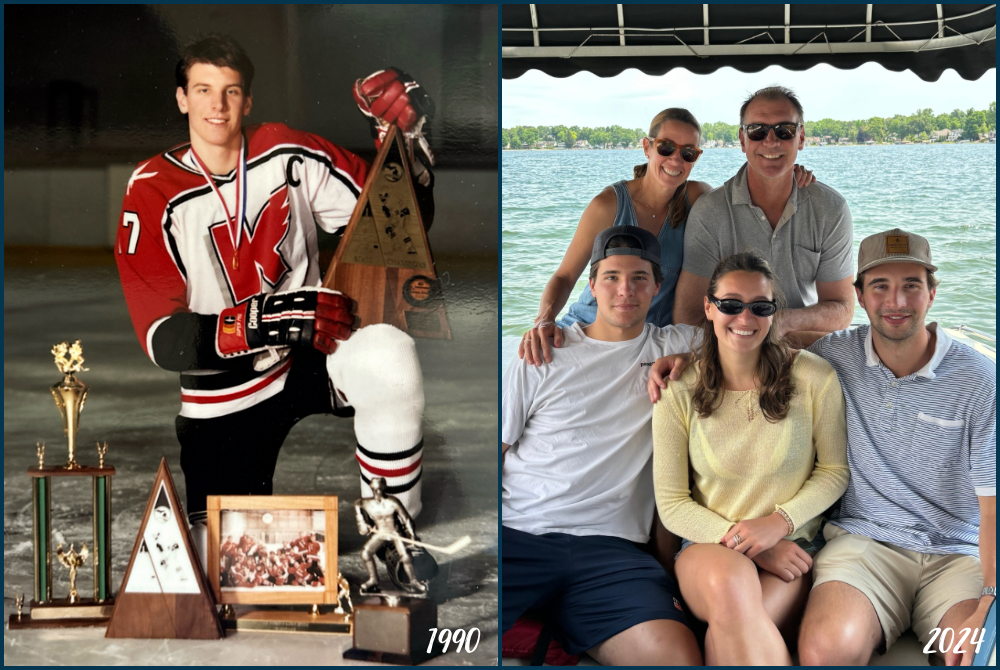
Moggach Honored Nationally for 25 Years of 'Sticking In, Doing Good'
By
Tim Robinson
Special for MHSAA.com
March 17, 2023
When Paul Moggach began his tenure as Brighton’s hockey coach, the program was at its nadir.
“When we got into high school hockey, it wasn't very good,” he said recently. “Our league wasn't very good. Our team wasn't very good. We started with character to try to build something different, you know, a different mousetrap.”
Over the next quarter of a century, Moggach and his assistants, primarily Rick Bourbonais (whom Moggach succeeded as coach) and current coach Kurt Kivisto helped lift the program into one of the most respected, and successful, in the state.
Moggach (pronounced MUG-uhth), along with former Detroit Catholic Central coach Gordon St. John, in February was named a co-recipient of the John Mariucci Award by the American Hockey Coaches Association.
They, along with Andy Weidenbach of Bloomfield Hills Cranbrook Kingswood, are the only Michigan coaches to have received the award, named after the longtime hockey coach at Michigan Tech.
“He brought in people that he knew could do things he may have had limitations at,” said Kivisto, who played for Moggach at Brighton two decades ago and was an assistant for 10 years before taking over as head coach in 2020. “He did a good job surrounding himself with people he trusted and knew would be good for the program while he steered the ship in the direction he wanted. And he was very good at that.”
Moggach calls the honor “very humbling.
“I got into hockey because there was a need,” he added, “then I ended up with Rick at the high school for those years. When you look back at it, I grew a lot. I grew a lot personally and from a coaching perspective I grew. I had to change things, and so I think it's not so much the reward as at least a recognition that I stuck it out. My grandmother used to always tell me, ‘Stick in and do good.’ She would say that when I was on the way out the door. That was her message to me, and I think (the award) just emphasizes that I did, I did stick in.”
“You can’t be happier for a guy than for a guy like Paul,” said Bourbonais, who coached with Moggach at Brighton for a total of 30 years, the last 20 as an assistant. “He took a hockey team and made it into a hockey program that is a top-five contender every year. Guys come out of the program with championships, but they also come out with life lessons and some idea of what it takes to be a great citizen and a great student as well as what it takes to be a great athlete.”
At first, though, there were trials. The Bulldogs struggled in his first two seasons, and the program itself was in jeopardy for a short while after a bench-clearing brawl.
Once that crisis passed, Moggach and his staff, which for many years consisted of Bourbonais, Mike Brown and Jason Valente, worked to rebuild the Bulldogs from a team known for its physicality to one with a more wide-open passing style of play.
When hockey trends went to a more defensive style, where the defense sparked the offense, Moggach adapted.
During the first decade of his tenure, as the Bulldogs had more success and built their reputation, teams that had shunned scheduling them in the past began adding Brighton to their schedules.
He kept looking for ways to improve his team, both on and off the ice.
Brighton was the first team to schedule a game with those in the Keweenaw Peninsula, both for the keen competition, but also as a team-bonding exercise.
The bus rides, about 11 hours each way, helped players who in many cases didn’t know each other outside the rink to bond. So did activities outside of hockey including team dinners and curling, and the experience of being together as a team for four days.
Other teams took notice, and team bonding trips, including those far shorter than the 550 miles from Brighton to Houghton, are commonplace.
 Soon after, he introduced a skating coach and stricter team nutrition to the program.
Soon after, he introduced a skating coach and stricter team nutrition to the program.
“It’s not something that we had done when I was in high school," said Kivisto, who graduated in 2003. “It was something that some of the families and players weren’t overly excited about, but he knew it was good for the team and he was always looking ahead and finding ways to give his team an advantage.”
Brighton grew to dominate its league, and winning gave Moggach the authority to introduce concepts new to players and families who grew up in travel hockey.
“I'm sure we weren't pleasing everybody,” he said, “But we thought we would do with character and live the kind of model that we would hope that the players would follow, that their families would follow. And as we did that it changed and we got in front of some things with our league, and had a good run in our league.”
Brighton won its first Division 1 championship in 2006. That was followed by back-to-back Division 1 titles in 2012 and 2013, and then 2017 and 2018, a stretch that saw the Bulldogs reach the Finals in six out of seven seasons.
“Some of that is when you learn how to win, you win, even sometimes when you shouldn't,” he said. “I'm not saying that you know when we got to the Finals that we didn't deserve to win. We had a good recipe there that got us those five wins, but once we got it rolling, that momentum kept us going sometimes then maybe it shouldn't have.”
As the program’s success and reputation grew, players who had been in travel hockey started opting to play for the Bulldogs.
“There are some kids on (this year’s Brighton) team who came from Triple A who are tired of that commitment, because of the travel, the time, the money,” he said. “And they found that high school hockey is different. I mean just look at the crowds. They don't get that kind of a reward for the work that they put in.
“I think it's developed to that point now for us and we get players like that and it's made a difference, I think, and not just for our team but for all of high school hockey, " Moggach continued. “The coaches association has done a great job in promoting now and so it is a great destination for so many good reasons for kids to spend that time and grow up with their friends who are in their neighborhoods and in their community.”
Moggach is still a fixture at Brighton games, still in close touch with Kivisto when not driving to see his grandsons play or his stepson, Damon Whitten, who coaches at Lake Superior State.
His impact will be felt in Brighton hockey for years to come.
“He left no stone unturned to try and be the best he thought we could be,” Brighton athletic director John Thompson said. “He’s one of those people who was genuinely invested in young people, and he always, always put the program first. He was a good manager of young men and developed some pretty good coaches, too.”
Moggach finished with a record of 467-172-43. St. John, who won six state titles at Catholic Central and another at Cranbrook, had a record of 229-29-18 in 10 seasons at Catholic Central.
“I was excited for (Moggach) when I heard the news,” Kivisto said, “seeing him put at a level of the guys who have won the award and the contributions they made to high school hockey. It’s neat to see him recognized at that level.”
Both men will receive their awards sometime this spring.
“I can be recognized,” Moggach said, “and I think kids are and their families are always looking for that. But I think before you do that you have to build the program, the program has to be something that's respectful and respected and competitive, and I think we accomplished that.”
***
Gordon St. John led Detroit Catholic Central and Bloomfield Hills Cranbrook Kingswood to a combined eight Finals championships over 16 seasons, the last seven with the Shamrocks including five straight in Class A or Division 1 from 1999-2003.
 DCC’s Class A championship in 1994 was the first of now 17 Finals titles, which rank second-most in MHSAA history. He built a 222-29-18 record (.859 winning percentage) over 10 seasons leading the Shamrocks through 2003-04, the last two seasons as co-head coach before then staying with the program as an assistant and helping the team to another Division 1 championship in 2005.
DCC’s Class A championship in 1994 was the first of now 17 Finals titles, which rank second-most in MHSAA history. He built a 222-29-18 record (.859 winning percentage) over 10 seasons leading the Shamrocks through 2003-04, the last two seasons as co-head coach before then staying with the program as an assistant and helping the team to another Division 1 championship in 2005.
St. John’s championship at Cranbrook came in 1988 in Class B-C-D.
PHOTOS (Top) Retired Brighton hockey coach Paul Moggach, far right, stands alongside his players as they await to receive their medals after winning the 2018 Division 1 championship (Middle) Moggach stands with his former assistant and current Brighton head coach Kurt Kivisto. (Middle photo by Tim Robinson; St. John photo courtesy of the American Hockey Coaches Association.)

East Kentwood Run Part of Memorable Start on Knuble's Way to NHL, Olympics
By
Dean Holzwarth
Special for MHSAA.com
July 24, 2024
KENTWOOD – It’s been more than 30 years since the 1990 Class A championship hockey game was played in Flint.
 However, Mike Knuble still recalls vividly a key moment that helped East Kentwood upset favored Trenton.
However, Mike Knuble still recalls vividly a key moment that helped East Kentwood upset favored Trenton.
“One of our players scored on a fluky bounce with about seven or eight minutes left,” said Knuble, who recorded a hat trick in the 5-4 victory. “(Trenton) threw everything at us after that, and somehow we held them off and they weren’t able to score. Our goalie had a heck of a game, and it happened to be our night.”
The state title was the program’s first. It also marked the final game of a remarkable high school career for Knuble, who would eventually go on to have a lengthy career in the NHL.
The Falcons had lost in the 1989 Semifinals to Flint Powers Catholic, which helped fuel their run to the championship game the following season.
“We felt we should be there as a team,” said the 52-year-old Knuble, who tallied an eye-popping 103 points (63 goals/40 assists) his senior year.
“We got by Flint Powers, and the question was if we could win the final game. Trenton had a nice program for a number of years, and a lot of history. We wanted to keep it close and then hang on.”
The emergence of the East Kentwood hockey program, guided by legendary coach Ron Baum, was a community initiative.
“We had a real grassroots effort in the 80s to get a youth program started, and that filtered to the high school,” said Knuble. “We built the rink by hand, and I remember hauling hoses into the building for the sand flooring. It was a unique time in Kentwood with the amount of focus on the program and buy-in from the community.
“It was a real nice high school to play for in the late 80s and early 90s, and we always had competitive teams and nice players. We played a lot of hockey when we were younger.”
In 1991, Knuble was drafted by the Detroit Red Wings in the fourth round, 76th overall, and played the next four seasons at University of Michigan.
He earned Central Collegiate Hockey Association second-team honors twice and was named an NCAA West All-American in 1995.
“I was pretty raw so I had to develop my skills as a player, and someone in the Red Wings organization identified some potential in me,” Knuble said. “It’s one thing to be drafted and another thing to sign a pro contract, so the good thing was Michigan gave me a longer runway to develop as a player on and off the ice. It gave me extra time to get my game in order in the right environment under a great coach.”
Knuble made his NHL debut on March 26,1997, against the Colorado Avalanche. He played nine games, but not during the playoffs as the Red Wings went on to win their first Stanley Cup championship since 1955.
Knuble made the roster the following year and was a part of Detroit’s 1998 team that won the Stanley Cup for the second straight season.
“I didn't have a huge hand in it; the players that were there really drove that bus, and we were younger guys,” Knuble said. “We had a lot of fun and enjoyed ourselves, but at the end of the day you know who really won things and it was a great experience as a young player.
“You learn what it takes to be a pro, you watch how guys operate and how a winning team works. Everyone accepted their roles.”
Knuble, who resides in the Grand Rapids area, would ultimately play 16 seasons in the NHL with Detroit, the New York Rangers, Boston Bruins and Philadelphia Flyers.
He played in 1,068 games and scored 278 goals along with 270 assists.
“As a player you go through cycles,” Knuble said. “Your first step is to get a foothold in the league and try to get in the league, and the second one is to stay there.
“And the third one is to be an everyday guy, and then fourth is to sign repeat contracts and play for as long as you can. And then you become one of the old guys. When I was younger I saw players who had their kids in the room, and I said that I wanted to play as long as that guy. I wanted to do that, and it means you've played for a long time.”
Knuble also was a member of the 2006 U.S. Olympic Team and won four world championships with Team USA.
“It’s a year-to-year, day-to-day business in pro sports, and it can go south at any time, but I got a lot out of it and had some great experiences,” Knuble said. ”I played in a lot of great cities, met a lot of great people and played a ton of games. It was a really good run, and we had kids and they were old enough to remember stuff and experience that, too.
“I played until I was 40, and if you are going to play until you're 40, you really don't have a lot to complain about.”
Knuble had been an assistant coach with the Grand Rapids Griffins for several years, but stepped away in order to spend time with his three children. He watches his two sons play collegiate hockey while also assisting a local youth hockey program.
Cam is in his fifth year at Western Michigan University, and Cole is beginning his second season at Notre Dame. Anna is a student at Michigan State University.
“I had two kids playing college and a daughter in the middle of college, so I learned to like my flexibility,” Knuble said. “I took last year off and now help with the Fox Motors program that has 15 and 16-year-olds. I’m staying in the game, just trying to help young players find their way and make decisions whether to play juniors or high school.”
After Knuble played his final season with the Flyers in 2012-13, he had the opportunity to coach both of his sons.
“That was really important to me,” he said. “I had many opportunities to work full time, but I wanted to be around to coach my sons and do the driving and take them places. To see where they could be as players. I played long enough where I could make a decision like that and take that route.”
Knuble is enjoying ‘the college life’ as he travels around supporting his children.
“We are seeing a lot of college campuses with tailgating and hockey games, and it’s been a lot of fun,” Knuble said. “Both have great hockey environments, and both are lucky to play in different types of programs. We’ve been very fortunate to have them play and go down to see them.
“That’s why I didn’t want to get locked into something fulltime where you wish you were watching them play versus what you’re doing.”
2024 Made In Michigan
July 22: Monroe High Memories Remain Rich for Michigan's 1987 Mr. Baseball - Read
July 17: Record-Setting Viney Gained Lifelong Confidence at Marine City - Read
July 11: High School 'Hoop Squad' Close to Heart as Hughes Continues Coaching Climb - Read
July 10: Nightingale Embarking on 1st Season as College Football Head Coach - Read
June 28: E-TC's Witt Bulldozing Path from Small Town to Football's Biggest Stage - Read
PHOTOS At left, East Kentwood’s Mike Knuble as a high school senior in 1990, and at right with his family. (Photos provided by Mike Knuble.)

